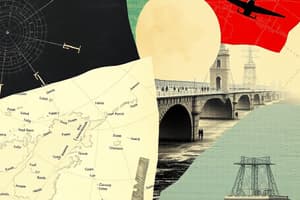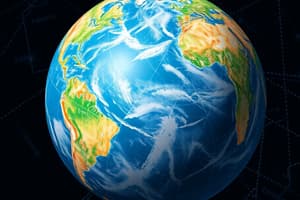Podcast
Questions and Answers
What is a time zone?
What is a time zone?
- An area on Earth with a specific time for citizens. (correct)
- An imaginary line that divides day and night.
- A measurement of time taken to travel.
- A period during which the sun is up.
Why are time zones necessary?
Why are time zones necessary?
- To ensure everyone sleeps at the same time.
- To regulate daylight savings.
- To accommodate the curved shape of the Earth. (correct)
- To synchronize international travel.
What happens when traveling east in relation to time zones?
What happens when traveling east in relation to time zones?
- You return to the previous time zone.
- You experience increased daylight.
- You enter a later time zone. (correct)
- You leave behind the sun.
If it is 3 P.M. in California, what time is it in Florida?
If it is 3 P.M. in California, what time is it in Florida?
What term describes the area that receives sunlight during the day?
What term describes the area that receives sunlight during the day?
Which of these statements about time zones is incorrect?
Which of these statements about time zones is incorrect?
What causes the differing patterns of sunrise and sunset among locations?
What causes the differing patterns of sunrise and sunset among locations?
How many time zones are generally found when traveling across the continental United States?
How many time zones are generally found when traveling across the continental United States?
What does it indicate if a friend lives west of you?
What does it indicate if a friend lives west of you?
Which is a reason time zones were created?
Which is a reason time zones were created?
Flashcards
What is a time zone?
What is a time zone?
An area on Earth with a specific time that everyone can set their clocks to.
Why do we need time zones?
Why do we need time zones?
Time zones exist because the Earth is curved like a ball. As the sun shines on the Earth, not all places get the same amount of sunlight.
How do time zones change as you move east or west?
How do time zones change as you move east or west?
The farther you travel from east to west, the more time zones you will pass through. Each time zone typically covers a region of roughly 15 degrees of longitude.
How do time zones relate to location?
How do time zones relate to location?
Signup and view all the flashcards
Who created time zones, and why?
Who created time zones, and why?
Signup and view all the flashcards
Are time zones natural or human-made?
Are time zones natural or human-made?
Signup and view all the flashcards
How can it be a different time of day in two places at the same moment?
How can it be a different time of day in two places at the same moment?
Signup and view all the flashcards
What causes time zones?
What causes time zones?
Signup and view all the flashcards
How many hours apart are time zones?
How many hours apart are time zones?
Signup and view all the flashcards
What happens to the time as you travel east or west?
What happens to the time as you travel east or west?
Signup and view all the flashcards
Study Notes
Time Zones Explained
- Time zones are geographic regions adhering to a consistent time for everyone.
- Time zones are essential for managing the different patterns of sunrise and sunset around the Earth.
- The Earth's spherical shape causes varying sunlight amounts across different locations.
- Time zones were defined by humans, not a natural phenomenon.
Time Zone Differences
- Moving eastward, the time becomes later.
- Moving westward, the time becomes earlier.
- Differences in time zones increase the further one travels.
Example Cases
- A person in California and a person in Florida experience different times, even if it's the same day.
- California, Colorado, Missouri, and Florida are in different time zones within the United States, affecting daily schedules.
- A significant time difference exists between California and Beijing, due to their longitudinal positions.
Studying That Suits You
Use AI to generate personalized quizzes and flashcards to suit your learning preferences.




